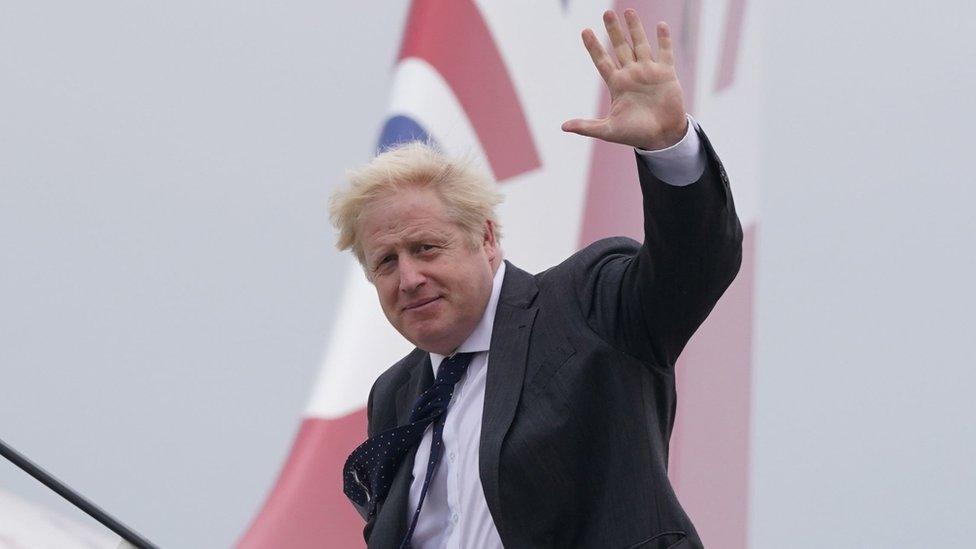Boris Johnson aims to push for more climate action during trip
- Published

Boris Johnson bounced from behind the grey curtain on the plane, clearly delighted to be travelling out of the UK, press pack and uniformed RAF stewards in tow, not the pilot perhaps, but acting as the host of the government plane he has had repainted with the Union Jack on the tail, urging journalists to approve of the new paint job.
However much Mr Johnson enjoys being back in the air and back physically with his political counterparts at the UN, this first prime ministerial trip in anything like normal times doesn't come at an easy moment.
At home, the government's trying to grapple with rising fears about supply chains, a shortage of gas and its many potential consequences - for energy firms, for supermarket shelves, even for fertiliser.
He put the problem down to the world waking up from pandemic shutdowns, like the moment when the nation rushes to "put the kettle on at the end of a TV programme".
Or, providing a more literary comparison if you are more that way inclined, the moment when Gulliver tries to stand but is still tethered by ropes in the classic novel by Jonathan Swift.
Whatever the explanation is, he acknowledged that there were very real "stresses and strains", but he said the problem was "temporary" and that the market would be swift to fix the issues.
Whatever metaphor Mr Johnson chooses, shortages on the shelves and rising bills are an uncomfortable combination for families and firms and not a situation any government would choose.
With that in mind, by the time we landed, with suggestions of emergency bailouts swirling at home, speaking on the tarmac, Boris Johnson said the government would "have to do everything we can", and "make sure we don't allow the companies we rely on to go under".
The situation is moving fast, but with high anxiety about rising prices, the government might be willing to step in.
Brokering climate deals a political priority
Bill hikes could also be a tricky consequence of some of the action the government wants to take itself to help combat climate change.
Ministers are still trying to thrash out the government's own final plans for Net Zero, cutting carbon emissions.
The proposals have been delayed and might not emerge for another month, with some of their own MPs worried at how costs of new boilers, for example, could be passed on to consumers.
But in the next few days in the US, Downing Street's focus is on what the rest of the world is really willing to do.
Over the next few weeks you'll start to hear more and more about what the government hopes to do as the massive climate conference, COP26, in Glasgow, approaches fast.
Climate Basics: CO2 explained
So the prime minister's main task on this trip to New York is to push other countries to make more meaningful promises on cash and climate.
Brokering these deals ahead of the conference in Scotland is a more important political priority by the day.
But on the plane Mr Johnson didn't sound hugely hopeful that there would be much progress, telling me that the chances of getting the financial agreements required by the time of COP were only "six out of 10".
Right now China, India and Russia are reluctant to make new commitments.
Number 10 would be cheered if the US were to commit more cash as soon as possible to increase pressure on others, but that may not happen this week.
The next few days of pressing the flesh, a round table with the UN secretary general and numerous bilateral meetings are critical chances for Mr Johnson to take strides towards getting other countries to make firmer promises - and COP being judged to be a political success, aside from the importance for the environment that the meeting is able to make meaningful progress.
With barely a month to go there's little question, that in the words of one insider, it is "very hard going".
Anglo-French relationship lavished with praise
Those vital discussions and careful conversations will take place in the wake of a diplomatic development that came, for many of Mr Johnson's allies, out of the blue - the deal between the US, the UK and Australia to share nuclear technology and build submarines.
The French (with, bear in mind, an election coming), have made little secret of their horror at the agreement, having lost out on their deal to build subs for Australia as a result.
Ambassadors have been recalled, accusations and insults have flown.
There is no doubt that the decision made by US President Biden, Mr Johnson and Australia's Prime Minister Scott Morrison, discussed in secret at the last huge international get together in Cornwall, is a major development in how countries work together that has spooked some of the three's allies and raised hackles in other parts of the world, not least Beijing.
For Mr Johnson it's "good for the world", and closer integration with two important allies.
You can read more about the tensions here since the three men announced the new pact last week.
But on the way to this next diplomatic event, the prime minister tried his best to be well, diplomatic, vowing that no other country ought to be worried about the deal, lavishing the Anglo-French relationship with praise, resisting the temptation to slap back at some of the barbed comments from across the Channel.
This is the start of a major trip for Mr Johnson - climate talks in New York when the issue has never mattered so much at home; a head-to-head in the White House, after the visible chaos as the two countries left Kabul; a world of shifting allegiances as the worst of Covid seems hopefully past at home.
